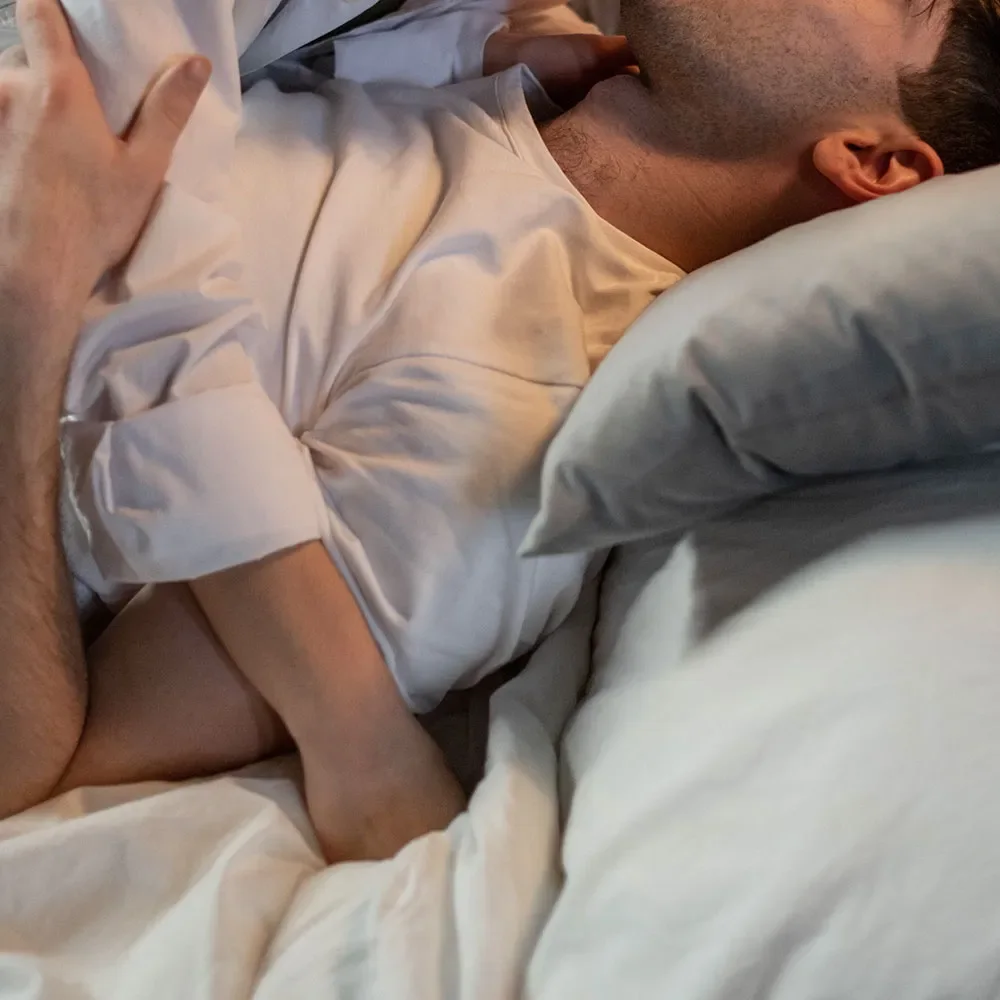Sexual performance anxiety: causes, symptoms, and how to overcome

Reviewed by Chimene Richa, MD,
Written by Michael Martin
last updated: Sep 16, 2021
4 min read
Here's what we'll cover
To quote Captain Obvious: Sex is supposed to be fun. But sometimes, we get stuck in our heads, and the prospect of having sex seems unappealing—you feel sure something bad is going to happen when the clothes come off.
The fear of how you'll do when you're doing it can put a serious damper on your sex life and preclude intimacy with a partner—that's when it becomes a problem. Luckily, it has some simple solutions.
What is sexual performance anxiety?
Sexual performance anxiety (SPA) is very common and can affect anyone, regardless of age, gender, sexual orientation, etc. It's when negative feelings about sex cause you to become self-conscious and worry that you won't satisfy your sexual partner. Think of it like stage fright in the bedroom.
Anywhere from 6% to 38% of people report sexual performance anxiety, although numbers could be higher since people don’t always report these issues. This makes sexual performance anxiety one of the most common sexual dysfunctions. It’s often seen as part of other sexual health problems like erectile dysfunction and premature ejaculation in men and can significantly decrease sexual desire and pleasure in women (Pyke, 2020).
Symptoms of sexual performance anxiety
If you experience sexual performance anxiety, you may have feelings like:
Fear that you're not "good enough" at sex or lack sexual experience
Fear that your genitals don’t “measure up”
Embarrassment over bad experiences (e.g., erectile dysfunction, premature ejaculation, lack of orgasm)
Insecurity about your body (e.g., body image issues)
Relationship problems
Anxiety or guilt about sexuality in general
Causes of sexual performance anxiety
It’s sometimes hard to know if sexual performance anxiety is a cause or an effect of another problem. Some people with sexual performance anxiety are unable to get an erection (erectile dysfunction or ED). Alternatively, having ED may make you anxious about sex and lead to sexual performance anxiety. Others might ejaculate too quickly (premature ejaculation), have difficulty reaching orgasm, or may avoid sex altogether—any of these problems can also lead to sexual performance anxiety.
This can lead to a vicious cycle: sexual performance anxiety affects your sexual function, you get more anxious about sex, and your sexual function worsens further. You need to break the cycle. Treating SPA may improve other sexual problems and vice versa.
Erectile dysfunction
Sexual performance anxiety can affect your erection during sex, causing ED. You might have softer erections, erections that don't last as long, or not be able to get one at all.
But ED isn't just about an ability to get hard—it's really about how you and your partner feel about your sex life. And if you're experiencing sexual performance anxiety, that feeling is not great.
They say that 90% of sex is mental, and in the case of sexual performance anxiety, that's definitely true. But performance anxiety causes physical reactions, too: When you're anxious, your body activates your "fight or flight" response and releases the stress hormones adrenaline and norepinephrine. These constrict blood vessels, keeping blood flow from getting where it needs to go—for sex, that means the penis in those who have one (Paravati, 2021).
This makes it challenging to get and keep an erection. If you fixate on a past episode of ED and worry you'll lose your erection this time, too, it can become a self-fulfilling prophecy.
Premature ejaculation (PE)
Sexual performance anxiety can also cause you to come too fast, known as premature ejaculation, premature climax, or early ejaculation. This sexual dysfunction is basically your body saying, "Get me out of here." One study found "a significant correlation" between performance anxiety and ejaculating prematurely (Rajkumar, 2014).
Orgasm difficulties
Performance anxiety can make it difficult for men and women to reach orgasm. Worrying about whether you're having bad sex can make the experience feel worse than it should for both partners.
Fear of sex
Sexual performance anxiety might cause you to develop an aversion to sex altogether, shutting down sexual desire and avoiding situations that might lead to intimacy.
How to overcome performance anxiety
Some tools can help overcome performance anxiety.
Mindfulness
An effective technique for combating anxiety of any kind is mindfulness. Staying mindful is especially important during sex. Mindfulness means staying in the present moment and concentrating on what you're doing instead of what you're thinking. For example, a person who feels anxious about a healthcare provider's visit while sitting in the waiting room might concentrate on their breathing and the smallest things they're doing, like turning the page of a magazine, sipping coffee, or tying his/her shoe.
This technique can effectively take us out of our heads, quiet negative self-judgments, and combat the anxious messages our brains send us about something terrible we imagine will happen in the future.
As you can imagine, practicing mindfulness during sexual activity can enhance the experience and help overcome performance anxiety. Concentrating on what you're doing during sex—the sensations of touch and what you're feeling physically and emotionally—can help shift your focus from how you're performing.
Cognitive behavior therapy (CBT)
Cognitive behavioral therapy (CBT) can help with anxiety by allowing you to recognize your thoughts or beliefs and the problems they are causing (that’s the cognitive part). Then, you can develop behaviors or relaxation techniques to decrease your anxiety, allowing you to re-evaluate and replace your negative thoughts (Chand, 2021).
Improve your self-image
There's nothing wrong with admiring celebrity photos or watching porn—but if you're spending too much time comparing yourself to others, you could experience sexual performance anxiety. You might believe that you don't "measure up" in terms of physical attributes.
The entertainment industry is filled with idealized versions of people's bodies and genitals. A negative self-image, especially genital self-image, can lead to sexual performance anxiety and sexual dysfunction (Wilcox, 2015). So, try to be mindful of the images you expose yourself to regularly.
Take care of your mental health
If you're feeling anxious about life in general, it might be a good idea to get professional help. Your sexual performance anxiety could be part of generalized anxiety disorder, which has several treatment options, including talk therapy and anxiety medication.
Be aware of your overall health
In some cases, recurrent sexual dysfunction like frequent ED (or worsening ED symptoms) can be an early warning sign of more serious health problems like heart disease, high blood pressure, diabetes, or depression. If you're experiencing PE, ED, or other sexual issues, it's a good idea to get medical advice from your healthcare provider.
DISCLAIMER
If you have any medical questions or concerns, please talk to your healthcare provider. The articles on Health Guide are underpinned by peer-reviewed research and information drawn from medical societies and governmental agencies. However, they are not a substitute for professional medical advice, diagnosis, or treatment.
Chand, S. P., Kuckel, D. P., & Huecker, M. R. (2021) Cognitive behavior therapy. [Updated Jul 26, 2021]. In: StatPearls [Internet]. Retrieved on Sept. 16, 2021 from https://www.ncbi.nlm.nih.gov/books/NBK470241/
Paravati, S., Rosani, A., & Warrington, S. J. (2021). Physiology, catecholamines. [Updated Jul 22, 2021]. In: StatPearls [Internet]. Retrieved on Sept. 16, 2021 from https://www.ncbi.nlm.nih.gov/books/NBK507716/
Pyke, R. E. (2020). Sexual performance anxiety. Sexual Medicine Reviews , 8 (2), 183–190. doi: 10.1016/j.sxmr.2019.07.001. Retrieved from https://pubmed.ncbi.nlm.nih.gov/31447414/
Rajkumar, R. P. & Kumaran, A. K. (2014). The association of anxiety with the subtypes of premature ejaculation: a chart review. The Primary Care Companion for CNS Disorders , 16 (4). doi: 10.4088/PCC.14m01630 Retrieved from https://www.ncbi.nlm.nih.gov/pmc/articles/PMC4318671/
Raveendran, A. V. & Agarwal, A. (2021). Premature ejaculation - current concepts in the management: A narrative review. International Journal of Reproductive Biomedicine , 19 (1), 5–22. doi: 10.18502/ijrm.v19i1.8176. Retrieved from https://www.ncbi.nlm.nih.gov/pmc/articles/PMC7851481/
Wilcox, S. L., Redmond, S., & Davis, T. L. (2015, June). Genital image, sexual anxiety, and erectile dysfunction among young male military personnel. The Journal of Sexual Medicine, 12 (6), 1389–1397. Retrieved from https://www.ncbi.nlm.nih.gov/pubmed/25929693/
Yafi, F. A., Jenkins, L., Albersen, M., Corona, G., Isidori, A. M., Goldfarb, S., et al. (2016). Erectile dysfunction. Nature Reviews-Disease Primers , 2, 16003. doi: 10.1038/nrdp.2016.3. Retrieved from https://www.ncbi.nlm.nih.gov/pmc/articles/PMC5027992/









